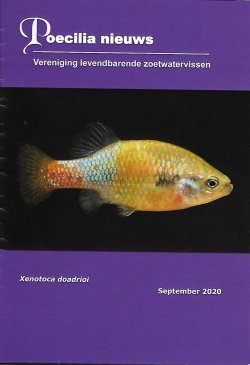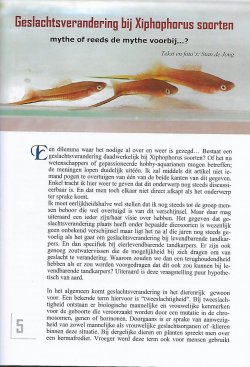This friday the mail came in. And so did the September issue of Poecilia news magazine.
An very discussed topic throughout the years is handled in my article with the title: Sex change in Xiphophorus species, myth are already beyond the myth...?
There are a lot of sex changes going on in the fauna world no matter what living species it may concern. It happens more often than most people may think. Three ways of sex change is mentioned in my article: protogyny (♀ → ♂), protandry (♂ → ♀) and bi-directional sex change (♂ →♀ or ♀ → ♂). Of course, me as being a passionate livebearer nerd will be focussing on the sex change within the livebearer field. And specifically when it comes to Xiphophorus species (where swordtails and platies belong to).
The article refers to my tests in the past with Xiphophorus species. But me not being a scientist do refer as well to a scientific paper from 2003 from a scientist that does show that it's possible that females can change into males. Using a wild swordtail strain for this research, they've found out that there are not 2 sex genotypes but three sex genotypes. I won't post the whole content of the article overhere. For the 6 pages is currently meant for paying members. I do expect some friction within the aquarium scene by publishing this article. I wonder what it will do if it get's also published in Germany. For there are a lot of Xiphophorus breeders in Germany. And a majority of them don't believe that it's possible.
Funny fact: The one who wrote the paper back in 2003 is a german scientist... And I haven't read elsewhere that people have referred to him about this item.



An very discussed topic throughout the years is handled in my article with the title: Sex change in Xiphophorus species, myth are already beyond the myth...?
There are a lot of sex changes going on in the fauna world no matter what living species it may concern. It happens more often than most people may think. Three ways of sex change is mentioned in my article: protogyny (♀ → ♂), protandry (♂ → ♀) and bi-directional sex change (♂ →♀ or ♀ → ♂). Of course, me as being a passionate livebearer nerd will be focussing on the sex change within the livebearer field. And specifically when it comes to Xiphophorus species (where swordtails and platies belong to).
The article refers to my tests in the past with Xiphophorus species. But me not being a scientist do refer as well to a scientific paper from 2003 from a scientist that does show that it's possible that females can change into males. Using a wild swordtail strain for this research, they've found out that there are not 2 sex genotypes but three sex genotypes. I won't post the whole content of the article overhere. For the 6 pages is currently meant for paying members. I do expect some friction within the aquarium scene by publishing this article. I wonder what it will do if it get's also published in Germany. For there are a lot of Xiphophorus breeders in Germany. And a majority of them don't believe that it's possible.
Funny fact: The one who wrote the paper back in 2003 is a german scientist... And I haven't read elsewhere that people have referred to him about this item.




